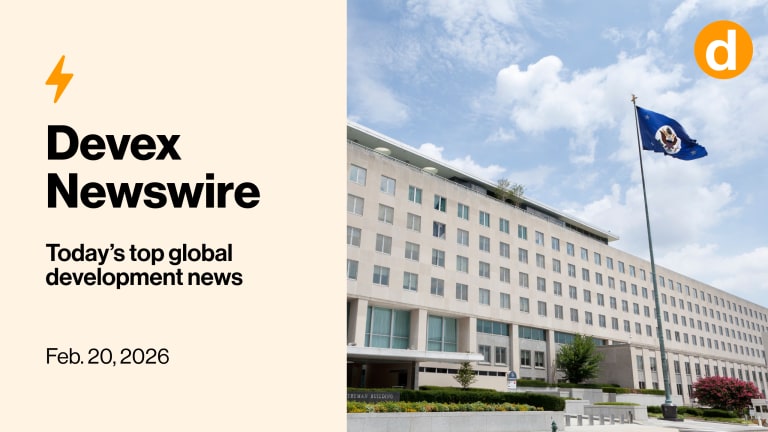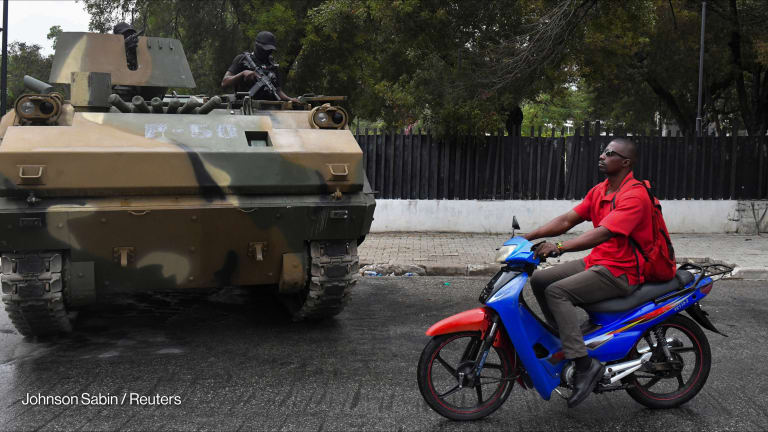Rajiv Shah: Lessons I've learned on humanitarian aid
In early 2010, Administrator Rajiv Shah led USAID’s relief efforts after the Haiti earthquake. In an exclusive interview, Shah shares his insights on why that disaster is different from the recent typhoon in the Philippines, and how local partnerships are changing the role of international NGOs in disaster response and recovery.
U.S. Agency for International Development Administrator Rajiv Shah assumed office in January 2010, one week before a 7.0-magnitude earthquake devastated Haiti, a disaster from which the Caribbean nation is still reeling, casting a shadow of criticism on U.S. relief and recovery operations. Now, faced with another major catastrophe in the case of Super Typhoon Haiyan in the Philippines — the scale of which is both historic and a likely sign of things to come as ocean temperatures increase and populations grow in coastal areas — Shah is tasked with coordinating a whole-of-government effort to help the former American colony recover from the devastation. As media attention to the Philippines wanes, he is reaching out to the public and urging Americans to continue to support disaster relief efforts. Devex spoke with Shah to learn how this recovery is different from Haiti, how the agency is working to reduce future storm impacts, and how its emphasis on local partnerships is changing the role for large international nongovernmental organizations in disaster response and recovery operations. Here are a few excerpts from our conversation with the USAID chief: I understand you’ve partnered with the Ad Council to produce these public service announcements, and USAID will be engaged in a broader communication campaign as well. What is the purpose of this campaign? USAID is proud to partner with the Ad Council on this public service campaign, and our goal is — as the cameras and the global attention unfortunately goes away from those millions of people in need of humanitarian support in the Philippines — that we continue to make visible and provide opportunities for Americans to contribute to that relief effort. We are asking Americans today to go to www.philippinesrelief.adcouncil.org, where they will find more than 50 pre-cleared and vetted humanitarian aid organizations that can immediately take financial contributions and allow those contributions to reach some of the most vulnerable families in the Philippines with immediate relief. The agency has been prioritizing working with local partners. Can you offer some specific examples of how you’re working with local partners during this Philippines response effort to ensure they have the necessary organizational capacity and understanding of how to work with USAID? USAID has helped to actually stand up and build the capacity of the Philippines national disaster management system and their incident command system, and that has allowed them to really be in the lead of this response, even though they have relied on a lot of civilian and military support from around the world. That’s one important example of standing up local institutions that can lead and over time putting ourselves out of business. A second example is that we’ve worked with their local municipal systems including their water systems to restart those local water systems, as opposed to bringing in a lot of external water on an ongoing basis. That’s just an important example of how a real focus on local systems can quickly stand up their capacity and capability, and a lot of people didn’t think we could do that. We got that done in Tacloban just a few days ago. We’ve seen the evidence that climate change will unfortunately lead to more and bigger disasters of this type. How do you see that context changing the role of the international NGO? This is the fifth typhoon we’re being called on to respond to since 2009 in the Philippines alone, and at the end of the day you want local institutions to have the capacity to respond but also have the capacity to plan and support communities to be at less risk. That type of work — my vision of success here — is that we’re working with local institutions so that families are at less risk, there’s more early warning, a strong local system exists to lead the response, and that the reconstruction that takes place over the course of the next month to years really prioritize building the local Philippines economy so that there’s strength and capacity and poverty reduction. That’s the goal. We want our partners to be self-sufficient and strong, and we know that we are better off when that’s the case. The large international NGOs will always play a unique role to surge capacity and to bring international best practice to local partners. It’s really forging those partnerships — that’s why, just today, if people go to www.philippinesrelief.adcouncil.org, the partners they will see there are mostly working hand-in-glove with local communities, and are not just trying to give out services, which is important and immediate and critical, but also trying to work with local partners so that they have the capacity to stand on their own two feet. Some potential contributors might have concerns about the post-disaster reconstruction effort, based on criticisms that arose in the wake of the Haiti earthquake, which struck shortly after you assumed office. What has changed since Haiti? Why should Americans trust their money will contribute to a reconstruction effort they can feel proud of? For starters, the Philippine government is very much managing and in charge of both the recovery and reconstruction. That’s critically important, because you need to have that point of leadership and coordination, and we are there to serve, not replace the leadership of the Philippine government and private sector and civil society themselves. By comparison, in Haiti, the day I arrived, 21 of 22 ministries had been completely flattened. The president himself was literally searching for members of his cabinet among the rubble. It was a level of institutional loss and collapse that is really not seen here. You really can’t compare the two. In this context, we will work with partners in the Philippines, construction firms and others to rebuild and build back stronger and better and more resilient communities, but that effort will be led by the Philippines themselves, and we will work with our international partners in a coordinated effort to help make that happen. How well advanced is USAID’s “resilience” programming? What steps will you take as administrator and what steps do you hope the agency will take to integrate building resilience across USAID’s portfolio? We work in the Philippines and elsewhere to set up the early warning systems, the urban planning structures and the fortification systems that try to enhance resilience. That will be the goal of the reconstruction, and USAID will play a very big role in leading that intellectually and operationally. That said, right now there’s such an urgent need for assistance that we’re hoping Americans will see that, and as they have in the past, as we head into a holiday season, be as generous as possible, so we can simply help people who otherwise will suffer through a cold, difficult and often homeless winter. See more: - USAID must improve on resilience, understand fragility — Rajiv Shah - Want to help? Tips on Philippine post-typhoon relief efforts - An island of hope for DRR in the Philippines - US food aid: A tale of 2 shipments to the Philippines Read more on U.S. aid reform online, and subscribe to The Development Newswire to receive top international development headlines from the world’s leading donors, news sources and opinion leaders — emailed to you FREE every business day.
U.S. Agency for International Development Administrator Rajiv Shah assumed office in January 2010, one week before a 7.0-magnitude earthquake devastated Haiti, a disaster from which the Caribbean nation is still reeling, casting a shadow of criticism on U.S. relief and recovery operations.
Now, faced with another major catastrophe in the case of Super Typhoon Haiyan in the Philippines — the scale of which is both historic and a likely sign of things to come as ocean temperatures increase and populations grow in coastal areas — Shah is tasked with coordinating a whole-of-government effort to help the former American colony recover from the devastation.
As media attention to the Philippines wanes, he is reaching out to the public and urging Americans to continue to support disaster relief efforts.
This story is forDevex Promembers
Unlock this story now with a 15-day free trial of Devex Pro.
With a Devex Pro subscription you'll get access to deeper analysis and exclusive insights from our reporters and analysts.
Start my free trialRequest a group subscription Printing articles to share with others is a breach of our terms and conditions and copyright policy. Please use the sharing options on the left side of the article. Devex Pro members may share up to 10 articles per month using the Pro share tool ( ).
Michael Igoe is a Senior Reporter with Devex, based in Washington, D.C. He covers U.S. foreign aid, global health, climate change, and development finance. Prior to joining Devex, Michael researched water management and climate change adaptation in post-Soviet Central Asia, where he also wrote for EurasiaNet. Michael earned his bachelor's degree from Bowdoin College, where he majored in Russian, and his master’s degree from the University of Montana, where he studied international conservation and development.








